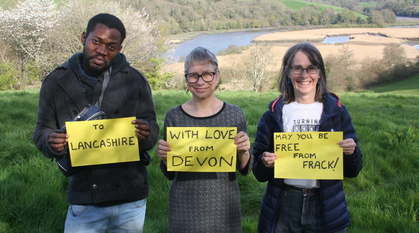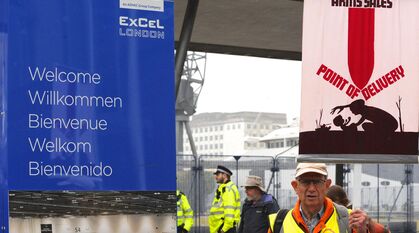What the world needs from COP26
Olivia Hanks sets out four things COP26 still needs to include to set us on a path to a just and liveable future.

The UN climate talks in Glasgow are reaching a crucial point, with negotiations due to finish on Friday (though they may run on into the weekend). We have seen an incredible coming together of movements in Glasgow and around the world to call for climate justice at COP26.
Yet inside the official venue, the talks are less transparent and less inclusive than they have been for many years. Halfway through the second week, the horse-trading and game-playing is underway, and we're already seeing worrying attempts to water down language on human rights.
Governments now need to move from headline-grabbing promises to concrete commitments that kick in immediately. And crucially, the richest countries need to do their fair share.
A final outcome document will be published at the end of COP26.
A draft was published this morning, with many gaps still to fill over the next two days. Here are four things the outcome needs to include to set us on a path to a just and liveable future:
1. Set up a loss and damage fund
COP26 needs to set up a loss and damage fund, with genuinely new and additional finance from richer countries to help pay for the damage caused by climate breakdown. The countries most vulnerable to climate change have been calling for this since 1991 – and as climate impacts worsen around the world, there must be no further delay.
We've heard much more talk of loss and damage at this COP than in the past, thanks to pressure from civil society – including Quakers and other faith groups. However, we're still not seeing concrete commitments. The draft outcome refers to the need for action on loss and damage, but with no specifics yet. We need to see a political decision to provide finance, and a commitment to include loss and damage as a standing item on all future COP agendas.
2. Meet climate finance targets based on need
Developed countries must meet their commitments to provide climate finance. In 2009, developed countries pledged to find $100 billion per year by 2020 to support developing countries with climate mitigation and adaptation. This target has been missed, and has now been extended to 2023. This is a disastrous abdication of responsibility by the world's richest countries – especially when the scale of need is so much greater now than 12 years ago.
Much of the finance that has been pledged towards the $100bn target so far has been in the form of interest-bearing loans rather than grants – creating a flow of money from poor to rich. A successful COP26 would see the $100 billion target met with grants and not loans. We also need to see progress towards a new target based on need and including finance for loss and damage as well as mitigation and adaptation.
3. Unite to rapidly phase out fossil fuels
If we are to have any chance of keeping global temperature rises to 1.5°C degrees, countries must unite around a commitment to rapidly phase out fossil fuels. The Nationally Determined Contributions (the commitment each country makes) announced so far, if implemented, would lead to a catastrophic 2.4°C rise. Based on current emissions rates, we would see a 3.7°C rise by 2100.
Any pathway to a stable climate must involve rapidly ending fossil fuel extraction. Some progress has been made in recent years on phasing out coal, but many countries continue to expand fossil fuel production. Today's draft document unexpectedly refers to the need to "accelerate the phasing-out of coal and subsidies for fossil fuels". But the documents are otherwise being described by observers as very weak, given that draft texts usually start with ambition before being watered down.
The pledge announced last week by 25 countries to end fossil fuel subsidies abroad must be extended to include domestic subsidies, and the COP26 outcome must include a commitment to a rapid phase-out of all fossil fuels, not just coal. Fossil fuel lobbyists (who outnumber the largest delegation at COP26), and the politicians who support them, must not be allowed to derail the talks.
4. Ensure fair shares in emissions reductions
The COP process must not abandon the principle of 'common but differentiated responsibilities'. This principle, which is written into the United Nations Framework Convention on Climate Change, means all countries have a duty to act, but rich countries have a duty to make a greater contribution.
The UK Presidency has been pushing to make this the COP of 'net zero 2050'. That's much too late and much too reliant on unproven technologies like carbon capture and storage. Crucially, it also imposes equal responsibility on all countries. The climate movement must keep stressing the importance of fair shares in emissions reductions. That means rich countries that have built their wealth on fossil fuels taking the most responsibility now.
COP26 can still be a turning point
Multilateral talks such as COP26 can be incredibly valuable in helping countries take collective action to tackle global crises. Too often, they are dominated by corporate interests and the most powerful countries.
But we also know that political currents move fast here, and that things can change suddenly. Politicians and negotiators are feeling the heat from the global climate justice movement, which is growing all the time. It is not yet too late for them to face up to their responsibilities and make COP26 a turning point.


